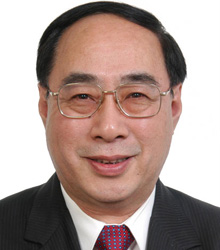| Senior Diplomat
 |
|
(FILE) |
Wu Hongbo, a senior Chinese diplomat and China's ambassador to Germany, was appointed under-secretary-general to lead the Department of Economic and Social Affairs (DESA) by UN Secretary General Ban Ki-moon, a UN spokesman announced on May 31. The 60-year-old diplomat is set to take over the position held by another Chinese official, Sha Zukang, since February 2007.
"Wu has over 30 years of high-level experience, including close collaboration at international conferences and with multilateral organizations," said Ban in a statement posted on the UN's official website. The statement noted Wu's role in helping China implement UN conventions on the environment and development as well as its report on progress toward the Millennium Development Goals.
Wu, born in east China's Shandong Province, graduated from Beijing Foreign Studies University and pursued graduate studies at Victoria University in New Zealand from 1978 to 1980. He has served as assistant foreign minister since 2007. In August 2009, Wu was appointed China's ambassador to Germany.
Interest Rates Cut
China's central bank cut interest rates for deposits and loans by a quarter of a percentage point on June 8.
It was the first time that the People's Bank of China cut the benchmark rates since December 2008, after which it raised the rates five times to drain liquidity.
After the cut, the one-year deposit interest rate fell to 3.25 percent while that of the oneyear loan interest rate was lowered to 6.31 percent.
The upper limit of the floating band of deposit rates will be adjusted to 1.1 times the benchmark level while banks are allowed to offer 20-percent discount to borrowers.
The latest move came as China's slowerthan- expected economic growth had raised concerns over an abrupt brake for the world's second largest economy.
China's GDP growth slowed to a nearly three-year low of 8.1 percent in the first quarter as key economic indicators for April continue to suggest downward risks.
Manufacturing Slows
The purchasing managers index (PMI), a readout of the country's manufacturing activity, ended five consecutive months of growth in May and retreated to 50.4 percent from 53.3 percent in April, the China Federation of Logistics and Purchasing (CFLP) said on June 1.
The figures for May showed that although China's economy decelerated, the overall growth trend remained unchanged, as the reading still stood above 50 percent, said the CFLP. A PMI reading of 50 percent demarcates expansion from contraction.
The sub-index for new orders dipped below 50 percent, to 49.8 percent in May, indicating shrinking demand in the manufacturing sector.
The world's second largest economy is likely to further lose steam with a decline in the sub-index for new orders, pointing to even weaker future factory activity, according to Zhang Liqun, a researcher from the Development Research Center of the State Council.
Zhang noted that the economic downshift will be mitigated by government efforts to maintain growth, especially policies aimed at stabilizing investment.
Boosting Rural Consumption
The Ministry of Commerce said on June 5 that home appliance sales under the country's rural subsidy program surged 72.6 percent year on year to 18.28 billion yuan ($2.9 billion) in May.
In the first five months, home appliance sales in the countryside rose 4.4 percent from a year earlier to reach 79.88 billion yuan ($12.68 billion). The volume of appliances sold in the period dropped 5.7 percent to 30.11 million units.
At the end of May, China had subsidized 248 million units of home appliances valued at 585.8 billion yuan ($92.98 billion) since the subsidy program began.
Initiated in 2009 to stimulate rural consumption and buoy the nation's economic growth amid the global economic downturn, the subsidy program will continue till January 2013.
Under the program, farmers can receive subsidies equal to 13 percent of the price of the home appliances they buy.
Auto Tax Reduction
China has announced a second wave of tax cuts for clean-energy cars, specifying 64 new energy-saving vehicles covered by the scheme.
The government has decided to halve vehicle taxes for buyers in these cases, in a bid to boost slow sales of green cars in the country. The fees for users of seven types of electric automobiles will be removed, according to a document jointly released by the Ministry of Finance, the Ministry of Industry and Information Technology, and the State Administration of Taxation on June 5.
At least 10 domestic auto producers were included in the list specified by the new policy, which took effect on January 1. Consumers who have bought the vehicles will get tax refunds.
The government first applied the policy in March, listing a first batch of eligible cars. At least 200 types of plug-in hybrid cars, pure electric cars and fuel cell vehicles were included.
SOE Breach
The Industrial and Commercial Bank of China (ICBC) and Citic Group Corp. violated several financial regulations in their lending and other operations, the National Audit Office (NAO) ruled on June 1.
NAO's routine audit of the two companies' activities in 2010 found they had broken rules on providing credit services, including granting loans to under-funded property projects and local government financing platforms, as well as providing bill discounting services to falsified trade contracts.
The audit office said the two companies had chaotic financial management, adding that some of their loans were misused by their clients.
Separately, the NAO also audited the financial revenues of 15 centrally administered state-owned enterprises (SOEs), including the country's two oil giants— China National Petroleum Corp. and China Petrochemical Corp.
It said various irregularities were uncovered in these companies, but that 97 percent of these violations had been rectified and that 87 people responsible had been penalized as of the end of March. | 